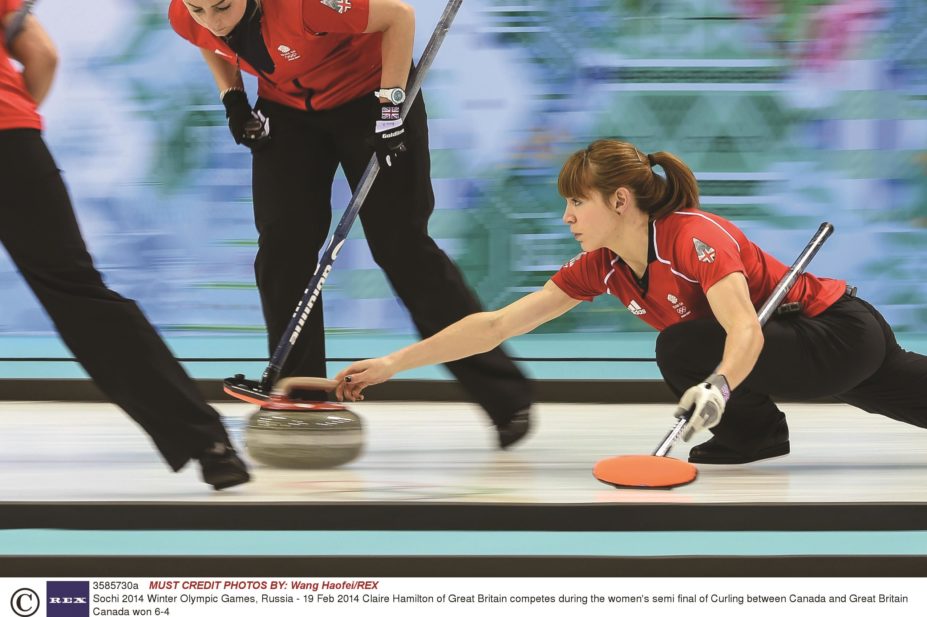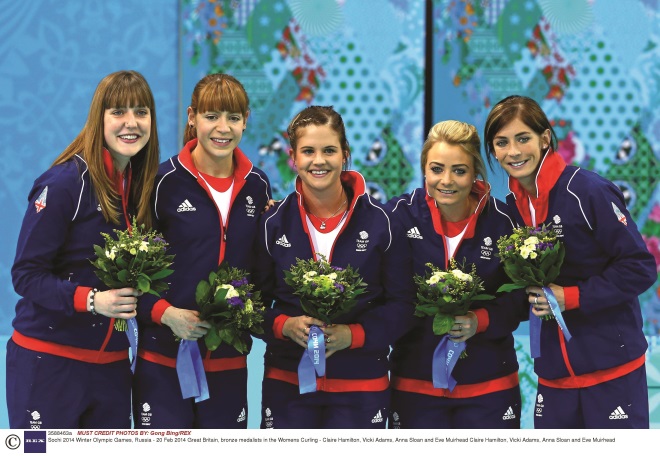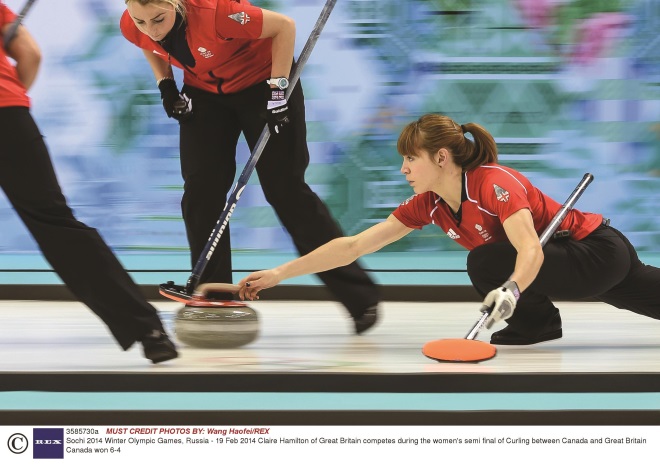
REX/WANG HAOFEI

Source: REX/GONG BING
Great Britain bronze medalists in the women’s curling at Sochi 2014 (left to right): Lauren Gray, Claire Hamilton, Vicki Adams, Anna Sloan and Eve Muirhead. Ms Hamilton was able to use her pharmacy knowledge while in Sochi because her team-mates asked her for advice on medicines
Do you know how to sweep the broom or get a stone into the house? It does not sound pharmacy-related, but one pharmacist knows all about it: Team GB’s Claire Hamilton, who took a bronze medal for women’s curling at the Sochi Olympic winter games last month.
I wish I had known her two years ago when I attempted the unusual sport during the time of the 2012 summer Olympics in London. The Russian government was promoting its upcoming winter games and set up a Russia-Sochi theme park in London’s Kensington Gardens, with a curling rink included. Let us just say I did not manage to “land your walnut in the centre of the nest”, the objective of curling, so aptly put by BBC natural history presenter Sir David Attenborough when he described the sport on Radio 1.
Considering curling’s now pharmaceutical connection, I think a more appropriate simile describing its objective could be landing your drug at its receptor site.
Well, Ms Hamilton, at the age of 25, did hit the “receptor” against Switzerland with her team with a 6-5 victory. She spoke to me on 25 February while at Heathrow Airport just before flying to Edinburgh to see her family and hold a press conference, after a flurry of media engagements “jam packed with ‘Breakfast TV’” and including a visit to 10 Downing Street.
How did she feel about winning bronze? “It was a strange mixture of feelings because obviously we went out to Sochi with gold in our sights and to lose the semi-finals was absolutely devastating and we were really gutted … then you have less than 24 hours to pick yourself up and come out and play your best game for the bronze because you definitely don’t want to come away empty-handed.”
Although it was a “strange day”, she thinks it showed team determination and team spirit that they managed to pick themselves up and bring out a really good performance for their last game.
“It was the one medal we were missing from our collection after being world champions and European champions in the past,” says Ms Hamilton, who trains twice a day on the ice, and started curling when she was eight years old. She joined her school team in her local Lockerbie area and then, at the age of 13, she started going away every weekend for competition.
She met her team members as part of these competitions, but the five-member curling team, as it is now, with Eve Muirhead as skip, formed three years ago. The team has collected a European silver in past two years and one European gold.
“Between us all we have different medals because we have been in different teams. [At the] world championship last year, we won,” she says.
Giving medicines advice to her team
Ms Hamilton was able to use her pharmacy knowledge while in Sochi because her team-mates asked her for advice on medicines. “Yes they do actually. It’s like after they have taken [a medicine] they ask ‘Is that OK?’”
Athletes need to know about what medicines they can consume under the anti-doping rules by the World Anti-Doping Agency.
“It is quite handy that the girls can ask me what they can and can’t take if they can’t get hold of somebody quicker.”
Another role she likes to play is to keep the team’s medical kit, when they are away, “stocked up”. What medicines are in it? Ibuprofen for injuries and sore and tight muscles, the antacid Tums, and rehydration sachets. Is the Tums for the celebration parties? “Definitely not, we may be allowed a few [drinks] in the next week,” she laughs.
So what are her top tips to pharmacists wanting to be athletes? “They will need to manage their time really well to fit in training. But it definitely is possible and you shouldn’t rule it out because you have a full-time job. Companies are much more supportive than you think in terms of letting you compete and things like that.”
Working in community pharmacy
She believes there are similarities between curling and pharmacy work. “I think, for both, you need to be an organised person. I went from a preregistration trainee to becoming a locum just because of the timing and being asked to play in that team. I had to have good time management.”
She studied pharmacy at the University of Strathclyde from 2006 to 2010, then she did her preregistration training with Lloydspharmacy in Glasgow.
“I really enjoyed that year. It was the year I started playing with Eve Muirhead’s team.” She had to extend her preregistration year by “a week or two” because of her curling commitments to undertake competitions.
“My work [employer] was flexible and I would work most Saturdays to make up for the days I needed to go to training and things like that.”
She only worked full time as a pharmacist in July 2013, after qualifying in the summer of 2011. Before then she worked part-time as a pharmacist, “[fitting] in locum shifts when I could”.
“I found it hard going straight from being a newly qualified pharmacist to being a locum but I managed to get in a lot of shifts with Lloydspharmacy, which I did my preregistration training with.” She also did shifts with other local pharmacies that were supportive because they knew about her curling. “I have actually heard from a few pharmacists while I have been away [in Sochi] [and it] is nice to know they are [supporting] me as well.”
Community pharmacy is a good option for her because of its flexibility, she says, suggesting that she may spend 40 per cent of her time doing pharmacy work with the rest dedicated to curling.
What has most stood out for her from community pharmacy? “I remember my first day when I was qualified and I was all by myself in the pharmacy in a 9am to 9pm shift and it was on a Sunday, and I just remember walking into the shop that morning being absolutely terrified, but actually being totally fine [as the day went by].”
Get out there and do it
Does she think newly registered pharmacists need more support? “I think it is one of those things that you just have to get out there and do it as soon as you qualify. I was lucky enough to have a good preregistration tutor who was always on hand and I could give him a telephone [call] or a text if I had any questions, so that was good.”
She says newly registered pharmacists need to be confident in their ability and “remember you have just done a preregistration year. You do know it, but you just have to do by yourself,” she says. The best advice she has ever been given is not to give up when you suffer a setback.
Looking ahead
On her next steps, she says it has been hard to plan anything past the winter Olympics because it has been such a big goal for so many years. “I am hoping to return to pharmacy for a little bit, probably not full time [since] I have a couple of tournaments this season, so I won’t be finished curling until April. It would be nice to have good balance.”

Source: REX/WANG HAOFEI
Claire Hamilton competes during the women’s semi-final of curling between Canada and Great Britain: Ms Hamilton trains twice a day and started curling when she was eight years old
In a way, perhaps her wish for a higher profile for curling mirrors that of pharmacy in the healthcare setting.After the media hype, she is going to drive to Glasgow and have “a bit of time off”, but she is circumspect about the sport’s future. “The only way to increase funding for curling is by winning medals, which is what we have done. I hope that has raised the profile [of curling] and hope we get a lot more people involved and a lot more facilities in the next few years.” There are around 30 curling rinks in Scotland but only one in England, which she describes as “sad”.


